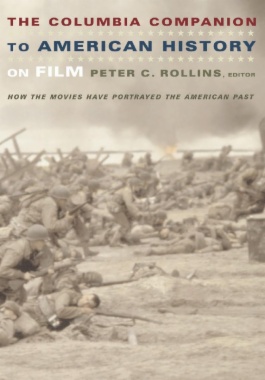American history has always been an irresistible source of inspiration for filmmakers, and today, for good or ill, most Americans'sense of the past likely comes more from Hollywood than from the works of historians. In important films such as The Birth of a Nation (1915), Roots (1977), Apocalypse Now (1979), and Saving Private Ryan (1998), how much is entertainment and how much is rooted in historical fact? In The Columbia Companion to American History on Film, more than seventy scholars consider the gap between history and Hollywood. They examine how filmmakers have presented and interpreted the most important events, topics, eras, and figures in the American past, often comparing the film versions of events with the interpretations of the best historians who have explored the topic.
Divided into eight broad categories—Eras; Wars and Other Major Events; Notable People; Groups; Institutions and Movements; Places; Themes and Topics; and Myths and Heroes—the volume features extensive cross-references, a filmography (of discussed and relevant films), notes, and a bibliography of selected historical works on each subject. The Columbia Companion to American History on Film is also an important resource for teachers, with extensive information for research or for course development appropriate for both high school and college students.
Though each essay reflects the unique body of film and print works covering the subject at hand, every essay addresses several fundamental questions:
What are the key films on this topic?
What sources did the filmmaker use, and how did the film deviate (or remain true to) its sources?
How have film interpretations of a particular historical topic changed, and what sorts of factors—technological, social, political, historiographical—have affected their evolution?
Have filmmakers altered the historical record with a view to enhancing drama or to enhance the "truth" of their putative message?
- CONTENTS
- ACKNOWLEDGEMENTS
- INTRODUCTION
- I. Eras
- The Puritan Era and the Puritan Mind
- The 1890's
- The 1920s
- The 1930s
- The 1960s
- The 1970s
- The 1980s
- II. Wars and Other Major Events
- The American Revolution
- The Civil War and Reconstruction
- The Cold War
- The Korean War
- The Mexican-American War and the Spanish-American War
- The Vietnam War
- Westward Expansion and the Indian Wars
- World War I
- World War II: Documentaries
- World War II: Feature Films
- III. Notable People
- The Antebellum Frontier Hero
- Christopher Columbus
- The Founding Fathers
- Indian Leaders
- The Kennedys
- Abraham Lincoln
- Richard Nixon
- Franklin and Eleanor Roosevelt
- Babe Ruth and Lou Gehrig
- Harry S. Truman
- George Washington
- IV. Groups
- African Americans After World War II
- Arab Americans
- Asian Americans
- Catholic Americans
- Children and Teenagers in the Twentieth Century
- Irish Americans
- Italian Americans
- Jewish Americans
- Mexican Americans
- Native Americans
- Radicals and Radicalism
- Robber Barons, Media Moguls, and Power Elites
- Women from the Colonial Era to 1900
- Women in the Twentieth Century
- V. Institutions and Movements
- Baseball
- City and State Government
- Civil Rights
- Congress
- The Family
- Football
- Journalism and the Media
- The Labor Movement and the Working Class
- Militias and Extremist Political Movements
- The Political Machine
- The Presidency After World War II
- Private Schools
- Public High Schools
- VI. Places
- The Midwest
- New York City
- The Sea
- The Small Town
- The South
- Space
- Suburbia
- Texas and the Southwest
- The Trans-Appalachian West
- VII. Themes and Topics
- Crime and the Mafia
- Drugs, Tobacco, and Alcohol
- Elections and Party Politics
- Feminism and Feminist Films
- Railroads
- Sexuality
- Slavery
- VIII. Myths and Hero
- The American Adam
- The American Fighting Man
- Democracy and Equality
- The Frontier and the West
- Hollywood’s Detective
- The Machine in the Garden
- Success and the Self-Made Man
- CONTRIBUTORS
- Iindex

